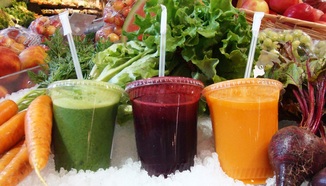 Juicing has been a topic I've heard about for quite a long time. During high school I worked in the produce department at a local grocery store. A few people would ask me about juicing and juicers, but I didn't know much at the time. One day, an older woman came up to me and explained how raw juicing saved her life. She was dying from cancer and claimed that after going on a juice only diet, she was cured and her doctors were absolutely baffled. My co-workers and I thought she was crazy, but what she said stuck in my head nonetheless. I went quite a few years not interested in juicing because it seemed costly and time consuming. I had tried it a few times after finding a juicer at a garage sale for $15 and thought the cleanup wasn't worth the effort. Then, after graduating chiropractic school, I was reintroduced to it by a colleague I worked with in Chicago. The ingredients he used figured to make a nasty tasting concoction, but to my surprise it always tasted excellent. At that point I was hooked. I found the old garage sale juicer and began making my own juices 4-6x a week. Dr. Oz writes this about juicing: "There are many health benefits of drinking freshly juiced fruits and vegetables, and it’s a great way to add nutrients from the fruits or vegetables that you normally wouldn’t eat. Fruit and vegetable juices retain most of of the vitamins, minerals and plant chemicals (phytonutrients) that would be found in the whole versions of those foods. These nutrients can help protect against cardiovascular disease, cancer and various inflammatory diseases, like rheumatoid arthritis. Valuable compounds called flavonoids and anthocyanins are abundant in a variety of fruits and vegetables and guard against oxidative cellular damage, which comes from everyday cellular maintenance and is exacerbated by exposure to chemicals and pollution." Dr. Mercola from Mercola.com writes that there are three main reasons to juice:
Getting StartedThere are a wide variety of juicers on the market. I've used a handful and have done quite a bit of research to find the perfect moderately priced juicer. Firstly, there are two main kinds of juicers - masticating and centrifugal. Masticating use slow speed and normally employ an auger to crush whole foods into juice while expelling out most of the fiber into a separate container. Centrifugal juicers usually operate at high speeds and use a form of grater that spins, releasing the juices and spitting fibers into a rear receptacle. The main benefit of each is that masticating supposedly introduces less oxygen, lower temperatures and leaves the healthy enzymes and nutrients more intact in your juice. Centrifugal normally have bigger feeding tubes which require less cutting up of foods and juice almost as fast as you can shove things down the tube for it to eat. Normally for people just getting started or in a hurry, centrifugal works just fine. If you have more time and want a "better quality" juice, then masticating might be your option. My favorite juicersCentrifugal
0 Comments
An interesting article on vaccinations:
I came across a post last week entitled “Dear Parents, you are being lied to. “ In it the author attempted to essentially tell parents who choose not to vaccinate that they are wrong, victims of a deceitful web of lies, and the equivalent of “vaccine preventable disease receptacles.” |
ChiroElite's Blog for Chiropractic, Health and Fitness InfoLive at Your Best Archives
March 2019
Categories
All
Thomas R. Pellatt, DCChiropractor and Owner of ChiroElite Chiropractic + Rehab in Altoona, WI |
|
ChiroElite Chiropractic + Rehab
1219 10th St W Altoona, WI 54720 p: 715.832.9725 |
OFFICE HOURS
Mon-Thurs: 8:00AM - 6:00PM Fri: 9:00AM - 12:00PM Sat & Sun: Closed |
Chiropractor Eau Claire • Meet the Doctor • About ChiroElite • Payment Options for Chiropractic • Terms
|
Copyright 2024 ChiroElite, LLC. All Rights Reserved
|
Website Design and SEO by Wisconsin Web Builder & Co.
|


 RSS Feed
RSS Feed
